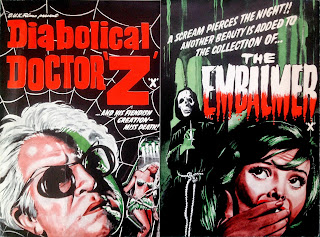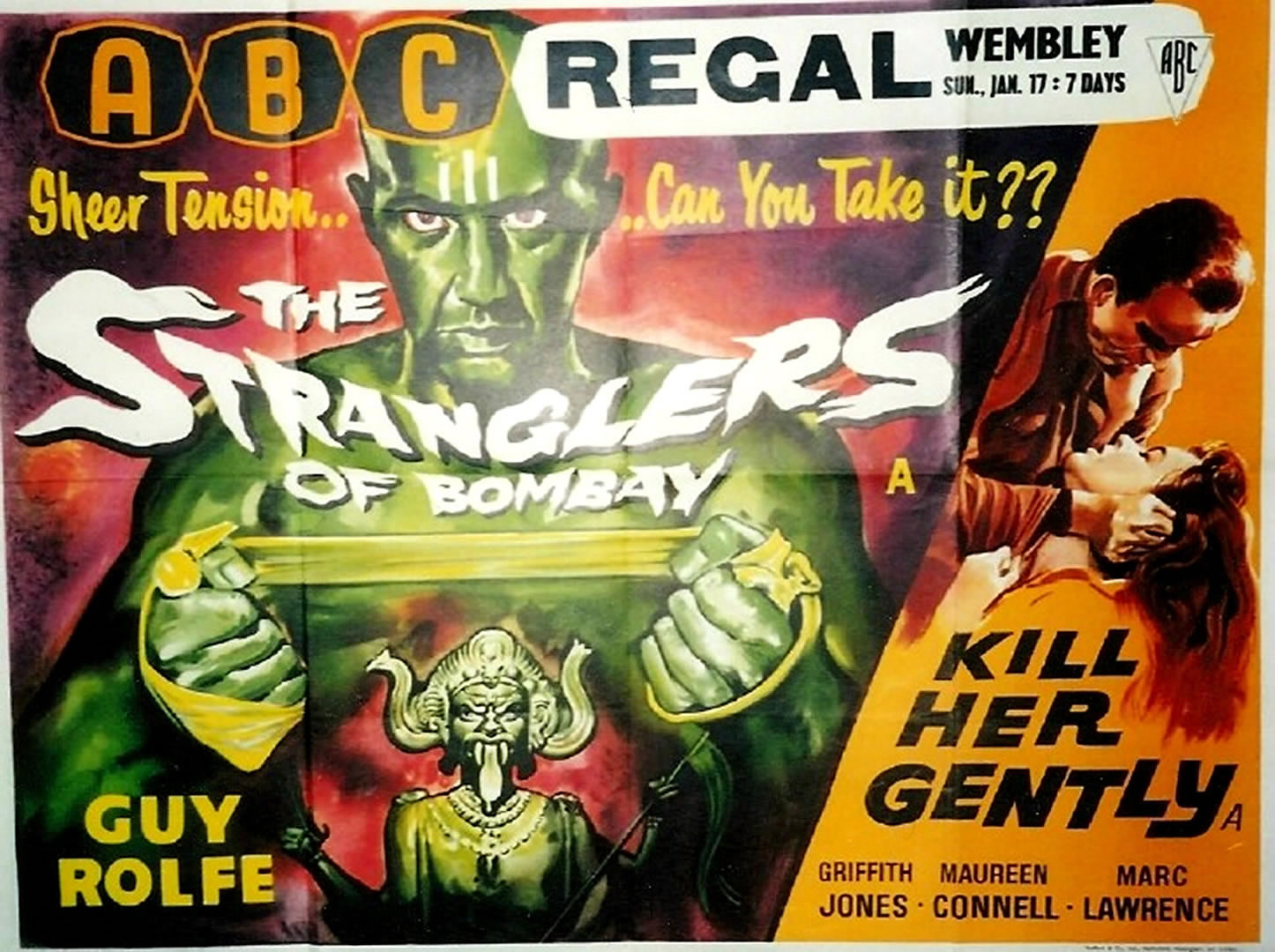My research interests, much to my chagrin, have often brought me back to the British sex film of the 1970s. I was even referred to as an "expert" in this field by fellow academics at a recent conference. This I find highly embarrassing. However, despite trying to get away from that field in the last few years, I do still find that my curiosity occasionally gets the better of me.
The new freeview channel Talking Pictures TV, an offshoot of the Renown DVD label, have acquired the catalogues of several small British distributors, including the titles owned by Adrienne Fancey. This has meant that I've kept an eye on the channel over the last couple of months. They have been screening long-forgotten films that the Fanceys produced and distributed as well as an assortment of other rare and often unmemorable movies. Amongst these have been some British sex comedies and dramas from the 1970s, a bleak period in our nation's film history when actors were forced into drab, badly written movies for the entertainment of raincoat-wearing audiences. These movies were generally always profitable and therefore producers would rather make them than take a risk on something more wholesome or artistic. I am sure that when people like Luan Peters were taking their clothes off in grubby, brown bedrooms, they had little idea that the films would still be playing to audiences some forty years later.
Which brings us to the Border Films-distributed Not Tonight, Darling (notice how the poster drops the comma), one of many films of that period to serve up the "bored housewife seeks extra-marital sex" plot-line. If the films and TV of the 1970s are to be believed, all wives were gagging for it, their husbands were too dull to notice, and it was left to an army of milkmen, window-cleaners and travelling salesmen to service their needs.
Luan Peters, perhaps best remembered for getting being bitten on the boobs by a Collinson twin in Twins of Evil (also 1971), plays Karen. Her prudish husband John (Jason Twelvetrees) commutes to a solicitors in London every day whilst she takes her young son Gary (Lance Barrett in his only film role) to school and then wonders around shopping and having drinks with friends. She is desperate to get some sex, or even attention, from her husband, but he is blind to her needs and only thinks about work.
What she doesn't realise however is that moustachioed shop-assistant Eddie (Sean Barry-Weske) is a peeping tom, and hovers outside her bathroom window at night in the hope of seeing her apply some moisturiser to her arms. Whenever she does appear his binoculars struggle to maintain focus, much like the audience at this point one imagines.
Eddie gets into a conversation with the smooth-talking stock supplier Alex (Australian actor Vincent Ball, who was approaching fifty at the time) at work the next day and they get chatting about Karen. Alex is clearly a player, and bets Eddie £5 (a lot of money in those days) that he can get her into bed by the end of the week. This being a film where we are expecting sex, that is precisely what happens. Alex picks her up in a bar and plies her with drinks. He then, for no obvious reason, takes her to watch the band Thunderclap Newman rehearsing. This scene is purely there to fill five minutes, as they just sit and watch, with Alex clicking his fingers like he is really hip, whilst this hairy sixties bunch play a whole song. This photo is the closest I could find to how they look in the movie.
The expression most of them have during this scene suggests that none of them know why they are there either.
Alex takes Karen back to his bachelor pad, which screams "serial killer". It's an almost bare room with only seventies curtains and photos from porn mags for decoration. I am sure I had curtains like this in my home when I was a child.
Despite all the signs to the contrary, Karen is talked into stripping and shagging. Little does she know that Alex has a photographer secreted in a cupboard documenting the whole thing, in order that he can prove to Eddie that he scored and thus claim his £5. He is one class act.
Karen returns home feeling guilty but liberated. That night she tries to give her husband a blow-job and he leaps out of bed, horrified. He demands that she never tries anything like that again. What a guy.
The next day Alex collects his winnings and celebrates by dropping a copy of the photos through Karen's door, in order to effectively blackmail her into coming with him again. She ends up at a sex party featuring hairy men and women dancing and shagging. One of these women, Suzanne, is actually the notorious horse-faced porn star Fiona Richmond in her feature-film debut. She is credited as Amber Harrison (her real name is Julia Rosamund Harrison).
Not Tonight, Darling treats us to some amusingly choreographed coupling before the camera pans to a large mirror on the wall, where we are let into the secret: it's a two-way mirror! And someone is filming this without anyone else knowing! Shock, gasp.
Sometime later Karen's husband John is taken to a strip club in Soho by grateful client Captain Harrison (Bill Shine, who in better times had appeared in The Red Shoes (1948) and other British classics) where he is presented with a hilarious striptease act by The Tiffany Sisters, who appear to have been real Soho strippers. The club itself is a tiny panelled preview cinema, and these girls dance and strip in front of just five men like their clothes are on fire. It is about as erotic as that sounds. Although the Captain is enjoying himself, and is something of a connoisseur when it comes to Soho strippers, John looks unmoved or unaroused. However, when a film comes on called Willing Flesh, which features his wife in a starring role, he promptly runs to the toilets and throws up.
Which brings us to the final scenes. He confronts Karen, calling her every name he can think of. She is tearful and sorry and tries to explain, but he is having none of it, and instead plans to take his son and return to his mother's house. Karen tells her friend Joan (Nicki Howorth) about the film, who by coincidence was also at the sex party. Joan then plans a revenge on Alex and his cameraman which involved kidnapping them both, stealing their clothes and dumping them in the countryside, filming the whole thing. We then cut back to a sad and wistful Karen at the bonfire party they had planned before all this happened, wondering whether she can persuade John to stay. And then the credits role, before we know what might become of them.
So what have we learned? Is this film a warning to housewives everywhere? No matter how little sex you are getting from your husbands, it's better than ending up in illegal hardcore porn? Like most of these sex-themed dramas, there is a moral judgement on the film's participants. The actors already feel bad for having to get their clothes off so often, yet their characters don't even get to enjoy it, having to suffer for their behaviour. There are also dead-ends in the plot, most notably with the peeping tom. We see a lot of him in the beginning, and we suspect that he is going to be a major character, but he then disappears, bumped from the screen by Alex. It is interesting that Karen seems to be the only person properly punished, yet she was driven to desperation by her husband's lack of attention. Eddie ought to have been arrested to spying on women through their windows at night, but it's seen as just a harmless hobby. Alex may have to get home naked, but there is little suggestion that he will not be returning to play the field once more.
Considering the likelihood of any bored housewives seeing this in cinemas was pretty slim, one can't help but wonder who was buying this conservative morality. The audience would most likely have been men hoping to see boobs, and they were rewarded for their suffering through the tedium of it all. The only real reason Karen is punished is to get the film past the BBFC. If she had enjoyed it all and not been suitably chastised it is likely that they would have refused a certificate. As it is there are several obvious cuts during the sex party scene, where things were literally cut from the print, leaving jumps in the music. Not Tonight, Darling is also an odd mix of drama with some comedy, most notably the kidnapping of Alex, which is the kind of ending one would expect in a Confessions of... film.
This was directed by Anthony Sloman, who according to the IMDB has mostly worked as a dubbing editor since the 1960s, and has credits on dozens of TV shows. He directed one other feature, Foursome (1972). No prizes for guessing the genre.
Not Tonight, Darling was one of the many sex films distributed by Border Films, which at that time was situated on Wardour Street in Soho next door to the famous Marquee Club. The day to day operations were taken care of by E.J. Fancey's common-law wife Olive Negus-Fancey and her son Charles.
Part of me hopes that this is the last British sex drama/ comedy I sit through, as they are dispiriting and depressing in many ways. Yet I am sure that once enough time has passed I will probably dip my toe in those murky brown waters again.


























